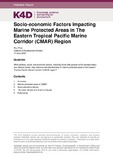| dc.contributor.author | Price, Roz | |
| dc.date.accessioned | 2022-09-05T12:58:42Z | |
| dc.date.available | 2022-09-05T12:58:42Z | |
| dc.date.issued | 2022-06-17 | |
| dc.identifier.citation | Price, R.A. (2022). Socio-economic factors impacting marine protected areas in the Eastern Tropical Pacific Marine Corridor (CMAR) region. K4D Helpdesk Report 1144. Institute of Development Studies. DOI: 10.19088/K4D.2022.107 | en |
| dc.identifier.uri | https://opendocs.ids.ac.uk/opendocs/handle/20.500.12413/17618 | |
| dc.description.abstract | This rapid review explores socio-economic and political issues that may affect the effectiveness
of the Eastern Tropical Pacific Marine Corridor (CMAR). It specifically focuses on key socioeconomic and governance issues around marine protected areas (MPAs) and exclusive
economic zones (EEZs) of Colombia, Costa Rica, Ecuador and Panama based in the Eastern
Tropical Pacific ocean. Research highlights the importance of understanding perceptions and
context in environmental governance analyses and practice (Partelow, Jäger & Schlüter, 2021);
and MPAs are increasingly recognised as being embedded in social-ecological systems, where
human dimensions (e.g., social, economic, cultural, political, and institutional) interact with
ecological characteristics (Burbano & Meredith, 2020, p.2). How do you define the effectiveness
of an MPA is another key question to consider (but not explored in detail in this review). Bearing
in mind that most MPAs have multiple objectives, including non-biological, which highlights the
need for the development and adoption of standardised effectiveness metrics beyond biological
considerations to measure factors contributing to their success or failure (Giakoumi et al., 2018).
For example, there are growing calls for marine conservation success to move beyond area
coverage to include a broader set of metrics related to the effective and equitable management
of the marine environment (see Bennett et al., 2021). Hence, the more information the better
when establishing integrated, well-designed and connected MPAs – for example, the more
information on a sea area, the coastal populations and their socio-ecological relationships, the
better stressors, systemic impacts and inter-annual variabilities can be identified, and the more
effective protection can be developed (Relano, Palomares & Pauly, 2021, p.13). | en |
| dc.description.sponsorship | Foreign, Commonwealth and Development Office (FCDO) | en |
| dc.language.iso | en | en |
| dc.publisher | Institute of Development Studies | en |
| dc.relation.ispartofseries | K4D Helpdesk Report;1144 | |
| dc.rights.uri | https://www.nationalarchives.gov.uk/doc/open-government-licence/version/3/ | en |
| dc.title | Socio-economic Factors Impacting Marine Protected Areas in the Eastern Tropical Pacific Marine Corridor (CMAR) Region | en |
| dc.type | Helpdesk | en |
| dc.rights.holder | © Crown copyright 2022 | en |
| dc.identifier.doi | 10.19088/K4D.2022.107 | |
| dcterms.dateAccepted | 2022-06-17 | |
| rioxxterms.funder | Default funder | en |
| rioxxterms.identifier.project | K4D | en |
| rioxxterms.version | VoR | en |
| rioxxterms.versionofrecord | 10.19088/K4D.2022.107 | en |
| rioxxterms.funder.project | 0986883a-6d0f-4bb8-9c46-5e0682934d65 | en |

